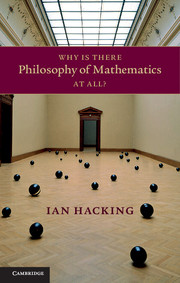Book contents
Chapter 6 - In Plato’s name
Published online by Cambridge University Press: 05 June 2014
Summary
Hauntology
Philosophizing about mathematics is haunted by platonism, both totally naïve and enormously sophisticated. It is supposed to be a kind of ontology, but one is tempted to recycle Jacques Derrida’s (1994) brilliant pun and call it hauntology. I had better explain. In Specters of Marx, based on a pair of lectures given in 1993, Derrida plays effectively on the repeated occurrence of ghost-words in Marx and Marxism. He starts with the first words of the preamble to the Manifesto: ‘A spectre is haunting Europe – the spectre of Communism’. Derrida’s message is very serious, the claim that hauntology is more embracing than ontology. Marx, who fights ghosts, is contrasted to Hamlet, who succumbs to them.
Once in place, the play on words is readily recycled. The British music critic Simon Reynolds uses ‘hauntological’ to describe UK electronic music that is created primarily by artists who manipulate samples culled from the past (mostly old wax-cylinder recordings, classical records, library music, or postwar popular music) to invoke either a euphoric or an unsettling view of an imagined future. He calls it ‘an uneasy mixture of the ancient and the modern’. The very same words seem apt when applied to contemporary platonism in the philosophy of mathematics.
- Type
- Chapter
- Information
- Why Is There Philosophy of Mathematics At All? , pp. 191 - 222Publisher: Cambridge University PressPrint publication year: 2014



